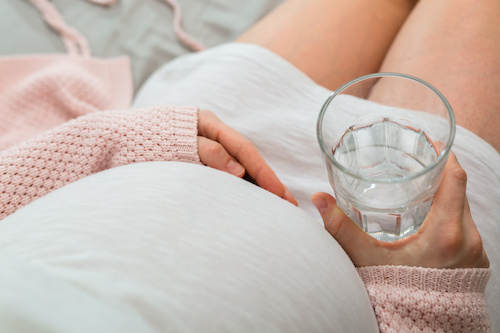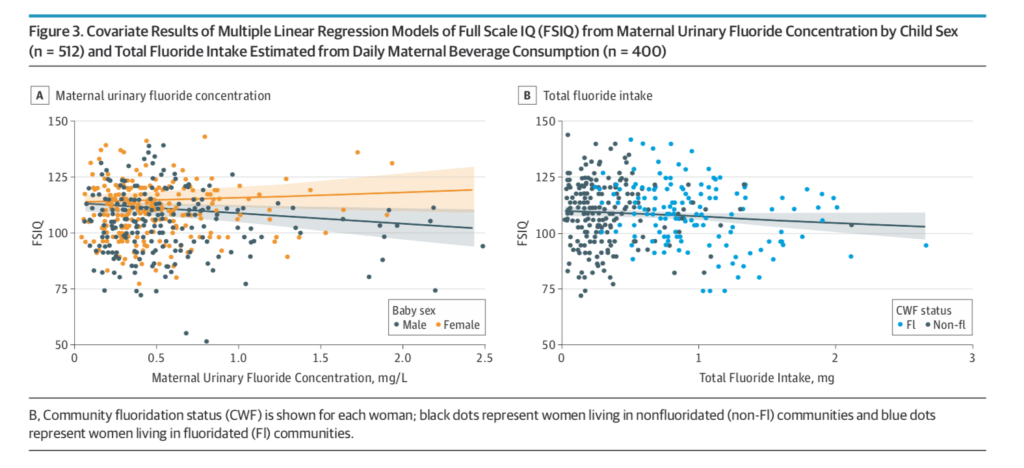While community water fluoridation has been used to prevent tooth decay,  health concerns about neurotoxicity have remained. A recent study about maternal exposure to fluoride sheds new light on the issue and shifts the conversation away from what has been considered junk science toward significance. From a clinical perspective, the corresponding commentary suggests that pregnant women consume filtered bottled water instead of tap water.
health concerns about neurotoxicity have remained. A recent study about maternal exposure to fluoride sheds new light on the issue and shifts the conversation away from what has been considered junk science toward significance. From a clinical perspective, the corresponding commentary suggests that pregnant women consume filtered bottled water instead of tap water.
This study, published in JAMA Pediatrics, examined the association between fluoride exposure during pregnancy and IQ scores from a prospective birth cohort, the Maternal-Infant Research on Environmental Chemicals cohort from six cities in Canada.
- Children were born between 2008 and 2012; 41% lived in communities supplied with fluoridated municipal water.
- The study sample included 601 mother-child pairs recruited from 6 major cities in Canada; children were between ages 3 and 4 years at testing. Data were analyzed between March 2017 and January 2019.
- Maternal urinary fluoride (MUFSG), adjusted for specific gravity and averaged across 3 trimesters available for 512 pregnant women, as well as self-reported maternal daily fluoride intake from water and beverage consumption available for 400 pregnant women.
The observational study of 601 mother-child pairs “hints at an apparent association between maternal exposure to fluoride during pregnancy and lower IQ scores measured in children ages 3 to 4,” write the researchers. The JAMA Pediatrics editor, David C. Bellinger, PhD, MSc, from Boston Children’s Hospital, Harvard Medical School, says that though further studies are warranted, he recommends that physicians advise pregnant women to drink filtered bottle water.
After accounting for factors associated with fluoride metabolism and children’s intellectual abilities the study found:
- A 1-mg/L increase in maternal urinary fluoride was associated with a 4.5-point lower IQ score in boys without a statistically significant association with IQ score in girls.
- A 1-mg higher intake of fluoride was associated with a 3.7 lower IQ score among boys and girls.
- The study’s conclusions are limited by its observational design, which can’t account for unmeasured factors that could explain the results, and there was no assessment of children’s fluoride exposure during infancy.
Maternal Exposure to Fluoride
In an accompanying editorial, Dr. Bellinger, writes: Many studies have reported inverse associations of children’s fluoride exposure with their cognition, but the inferences that can be drawn from these studies are limited by their generally poor quality.” He cited a number of studies in China, New Zealand and Mexico with differing results. This new study changes what is currently known and is significant in many ways, he says.
“The most important finding was a significant inverse association of maternal urinary fluoride concentration with children’s Full Scale IQ scores at age 3 to 4 years in boys, such that a 1-mg/L increase in concentration was asso- ciated with a deficit of 4.5 (95% CI, −8.4 to −0.6) points.” ~ David Bellinger, PhD, MSc.
Dr. Bellinger writes that this particular study adjusted for important covariates (eg, maternal education, race, quality of the home environment), which included chemicals such as lead, mercury, manganese, perfluorooctanoic acid, or arsenic. Also, researchers took into account fluoride concentrations in the spot maternal urine samples, which were adjusted for dilution using both specific gravity (primary analyses) and creatinine levels, with similar results.
Dr. Bellinger says that while no single observational study “provides a definitive test of a hypothesis, and early studies of an association that is subsequently confirmed tend to report larger effect sizes than do later studies.” …
“These considerations notwithstanding, the hypothesis that fluoride is a neurodevelopmental toxicant must now be given serious consideration.”
The controversy surrounding this particular fluoride study was acknowledged by a JAMA statement about their decision to publish this paper. The journal writes:
This decision to publish this article was not easy. Given the nature of the findings and their potential implications, we subjected it to additional scrutiny for its methods and the disseminating the best science based entirely on the rigor of the methods and the soundness of the hypotheses tested, regardless of how contentious the results may be. That said, scientific inquiry is an iterative process. It is rare that a single study provides definitive evidence. This study is neither the first, nor will it be the last, to test the association between prenatal fluoride exposure and cognitive development. We hope that purveyors and consumers of these findings are mindful of that as the implications of this study are debated in the public arena.” ~Dimitri A. Christakis, MD, MPH in JAMA Pediatrics
For more from Dr. Bellinger, listen to the following podcast:
Many questions remain says Dr. Bellinger, including:
- How replicable and generalizable are the associations reported by Green et al?
- Is there a maternal urinary fluoride concentration below which the risk of neurotoxicity is negligible? Although the association with IQ did not depart from linearity, suggesting that there might not be such a level, the Mexico City study found 0.8 mg/L to be a possible threshold.
- Are boys more vulnerable than girls?
- Is IQ just the tip of the iceberg, with some developmental domains more sensitive than others?
- Might nonverbal skills might be more affected than verbal skills?
- How does greater fluoride exposure associate with attention- deficit/hyperactivity disorder–related behaviors?
- Is the prenatal period the most critical window of exposure? Does postnatal exposure also confer risk?
Conclusion/ In this prospective birth cohort study from 6 cities in Canada, higher levels of fluoride exposure during pregnancy were associated with lower IQ scores in children measured at age 3 to 4 years. These findings were observed at fluoride levels typically found in white North American women. This indicates the possible need to reduce fluoride intake during pregnancy.






